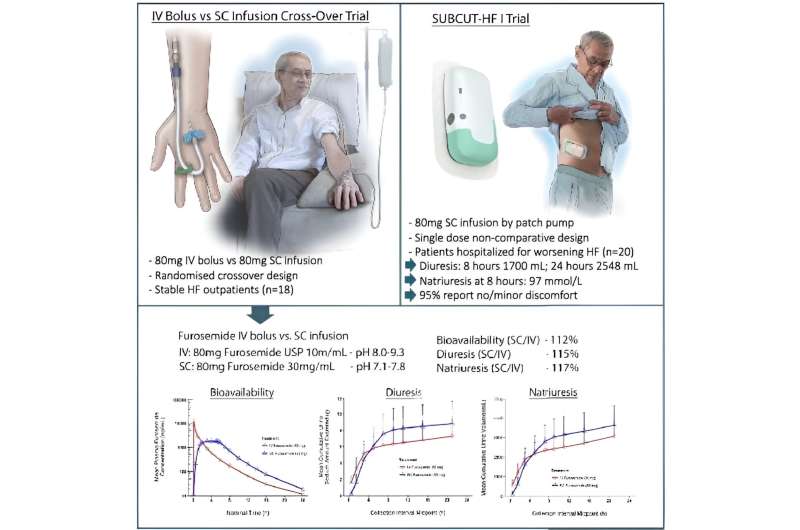This article has been reviewed according to Science X's editorial process and policies. Editors have highlighted the following attributes while ensuring the content's credibility:
fact-checked
trusted source
proofread
New device and drug combination could revolutionize heart failure treatment

A newly-developed heart failure device and medication combination is safe and effective to use, and will allow patients to receive treatment from the comfort of their own home.
The new device and drug combination was developed by SQ Innovation Inc and tested by the University of Glasgow Heart Failure Clinical Trial Team as part of two landmark patient studies. The results of both trials are published together and show that the innovative new combination has the potential to revolutionize heart failure treatment.
The paper, "A novel, small-volume subcutaneous furosemide formulation delivered by an abdominal patch infusor device in patients with heart failure: results of two phase I studies," is published in the European Heart Journal—Cardiovascular Pharmacotherapy.
Heart failure is a condition where the heart does not pump blood around the body as efficiently as it should. As a result, fluid often gathers in the lungs or legs, causing shortness of breath and/or swollen legs.
Current treatment for this is diuretic tablets, or "water tablets," which make patients pass more urine. However, if there is a lot of swelling and fluid build-up in the body, the tablets are less effective and patients instead need to treated in hospital with medication (usually a drug called furosemide) given intravenously through a drip.
In the UK, heart failure accounts for 180,000 annual NHS inpatient bed days. Currently, patients admitted to hospital with fluid overload require on average around 10 days of treatment with furosemide—representing a significant burden for patients, their families and the NHS.
Findings from the landmark University of Glasgow research, which was conducted in collaboration with NHS Greater Glasgow and Clyde, could improve the lives of heart failure patients, and may also help reduce the strain on hospital beds by removing the need for lengthy inpatient treatment.
The two clinical trials investigated a new skin-friendly preparation of furosemide designed to be administered under the skin (subcutaneously) by patients themselves, in their own home. The first study assessed how effective this new version of furosemide was, and showed the new drug was absorbed as well as traditional treatment, with minimal side effects.
The second patient trial looked at treatment with the new skin-friendly furosemide in patients in hospital, delivered by an innovative mini pump designed by SQ Innovation Inc. The pump is fitted with a small needle, which delivers the new drug under the patient's skin to help reduce fluid build-up. The researchers found the combination of the new drug and device was safe and effective to use.
Dr. Joanna Osmanska, clinical research fellow, was involved in treating the patients with the new device and new drug said, "We are pleased that our patients were impressed with how straightforward and intuitive the SQIN-pump is. This is a big step forward in our mission to improve life for patients with heart failure and this study demonstrates how effective this treatment method can be."
Dr. Ross Campbell, clinical senior lecturer at the University of Glasgow and Consultant Cardiologist and principal investigator at Queen Elizabeth University Hospital, Glasgow, where the trial was conducted said, "This study is an excellent example of the type of practice-changing clinical research that is possible within the NHS."
"This study, which brought together a partnership of NHS GGC, the University of Glasgow and our industry partner SQ Innovation Inc, has shown how effective this new treatment can be in a real-world clinical setting. The study results allow us to progress to the next phase of the research program, enabling us to treat patients with heart failure in their own home."
Alexander Miller, 66, from King's Park, Glasgow, was diagnosed in July 2021 and was a patient who took part in the first stage of the trial, using the device in hospital.
"The device was no problem at all—unobtrusively attached to my body, it allowed me freedom to do what I wanted to do, with no restrictions and was more controllable that the regular medication. It wasn't painful in any way, and after it [the device] was attached, I wasn't aware of it. I lost 2.5 stone in fluid and it worked well in comparison to the normal medication. I was quite impressed with it, and can see how it would give patients more freedom to do other things and manage their day better."
Findings from these studies have now been used to plan a large study in which patients admitted to the hospital with excess of fluid caused by heart failure are now offered to use the new medication and the pump at home.
Lorraine McManus, 62, from Knightswood, Glasgow, was diagnosed suddenly with heart failure in April of this year, and was asked to participate on the trial to administer the drug themselves at home. She said, "It was so easy to do and very simple to use, you didn't even know you had it on. At the time, I worked seven days a week, so by being able to use this treatment at home, it meant I didn't miss any work, I could avoid a stay in hospital and wasn't restricted by what I could do."
More information: Joanna Osmanska et al, A novel, small-volume subcutaneous furosemide formulation delivered by an abdominal patch infusor device in patients with heart failure: results of two phase I studies, European Heart Journal—Cardiovascular Pharmacotherapy (2023). DOI: 10.1093/ehjcvp/pvad073



















